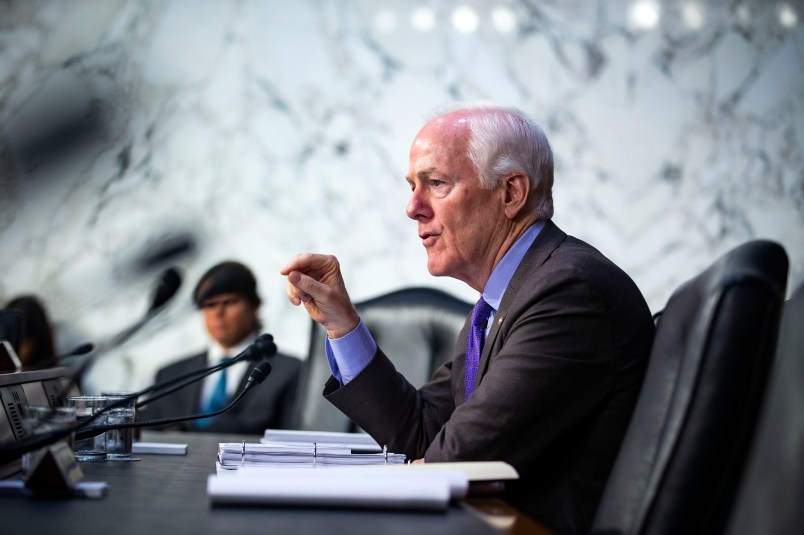Sen. John Cornyn (R-TX) has displayed a similar strategy recently as he cross-examines witnesses before the Senate Judiciary Committee on the racist effect of restrictive voting laws.
In a “gotcha” type setup, he tries to lure the witness — last week top Justice Department nominee Kristen Clarke, this week Stacey Abrams — into saying that restrictive voting laws hurt Black people. Then he whips out a statistic to try to prove them wrong.
At last week’s hearing with Clarke, Cornyn attempted to push her into saying that voters of color were suppressed in 2020 before touting his state’s high voting numbers.
He tried a similar gambit during a contentious exchange with Abrams on Tuesday.
Is the Georgia voter law “a racist piece of legislation?” he asked.
“There are components of it that are indeed racist, because they use racial animus as a means of targeting the behavior of certain voters to limit their participation in elections,” she responded.
He pressed further, asking if all states without no-excuse absentee voting are racist. As Abrams responded, Cornyn snapped that she was “filibustering.”
He tried to push her into saying that all voter ID requirements are racist — a mischaracterization of Abrams’ position that she had contradicted multiple times during the hearing alone. She pushed back against Cornyn, saying that her opposition lies with restrictive voter ID requirements like those the Georgia law imposes on absentee voters that threaten to push people out of the voter pool.
“So sometimes it’s racist, sometimes it’s not racist?” Cornyn asked incredulously.
“Intent always matters, sir,” Abrams responded. “That’s the point of this conversation.”
Cornyn then got around to his gotcha, saying that majorities of Black and all voters support voter ID requirements.
“I’m among those who support voter ID!” Abrams exclaimed.
Cornyn then cut her off and tried to move on to a different witness.
From the first moments of ranking member Chuck Grassley’s (R-IA) comments on Tuesday, it became clear that there would be very little common ground between Democrats and Republicans during the combative hearing.
While Democrats have been pounding the alarm on restrictive voting laws from state legislatures nationwide, Republicans have claimed that the laws are not actually restrictive, homing in on innocuous parts of the laws and high turnout levels in 2020 as proof. Most of the laws are coming from GOP-led state legislatures, with many lawmakers using decreased trust levels in elections — a direct ramification of former President Donald Trump’s election fraud lie — as an excuse.



